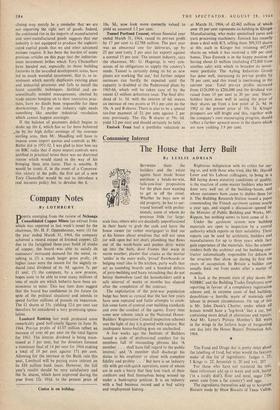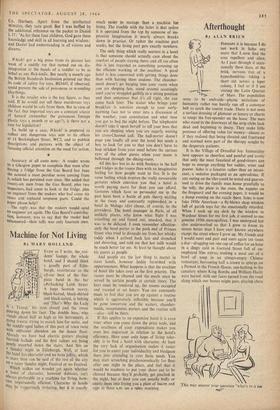Consuming Interest
The House that Jerry Built
By. LESLIE ADRIAN BETWEEN them the • builders and the estate • agents have made house
purchase a heads-we-win, tails-you-lose proposition for the plain man wanting to get in off the street. Whether he buys new or old property, he has to sur- round himself with profes- sionals, some of whom do precious little for large- scale fees, others who are decidedly unprofessional in their haste to grab the cash and leave the house owner (or rather mortgagee) to find out at his leisure about windows that will not open (or will open but not shut), plumbing that flows out of the wash-basin and pushes dirty water up into the bath, door frames that warp in warm weather, plaster that cracks as the mortar 'settles' in the outer walls, 'proud' floorboards or bulging vinyl tiles in the kitchen, party walls that act as sounding boards and a hundred defects of jerry-building and hasty retouching that do not betray themselves (and the householder) until a safe interval of weeks or months has elapsed after the completion of the contract.
The exploitation of the post-war population bulge has been so cynical that the last few years have seen repeated and futile attempts to estab- lish some form of control over building standards and over the conduct of the agents. Every time some new scheme (mach as the National House- Builders' Registration Council inspection scheme) sees the light of day it is greeted with rapture. But inadequate house-building goes on unchecked.
A few weeks ago the Institute of Builders issued a code of professional conduct for its members full of resounding phrases like 'A member . . . shall have full regard to the public interest,' and 'A member shall discharge his duties to his employer or client with complete fidelity and probity . . .' But here is an industry rife with get-rich-quick operators, some of whom are in such a hurry that they lose track of their creditors and find themselves being wound up under a bankruptcy petition. It is an industry with a bad business record and a bad safety and employment history.
Righteous indigriation with its critics for say- ing so, and with those who tried, like Mr. Harold Lever and his Labour colleagues, to bring in a Bill laying down statutory conditions of quality, is the reaction of some master builders who have done very well out of the building- boom, and whose customers have cause to dislike them for it. The .Building Research Station issued a paper commending the French agrement system nearly a year ago, and staged a discussion opened by the Minister of Public Building and Works, Mr.
• Rippon, but nothing seems to have come of it.
Under the agrement system new building materials are open to inspection by a central authority which reports on their suitability. These reports can be used by architects, builders and manufacturers for up to three years while they gain experience of the materials. Also the scheme renders both the architect and the building con- tractor automatically responsible for defects in the structure that show up during its first ten years of occupation. In Britain a builder can usually duck out from under after a matter of months.
A look at the present state of play shows the NHBRC and the Building Trades Employers now reporting in favour of a compulsory registration scheme and, in extreme cases of bad building, demolition—a horrific waste of materials and labour in present circumstances. On top, of this is Mr. John Davis's Charter, under which all houses would have a log-book' like a car, but containing more detail of alterations and repairs. And Mr. Lever's Private Member's Bill waits in the wings in the forlorn hope of burgeoning one day into the House Buyers' Protection Act, 1964.
The Food and Drugs Act is pretty strict about the labelling of food, but what would the lawyers make of this list of ingredients: Judges v. 25; I Kings iv. 22; Jeremiah vi. 20 and xvii. 20?
For those who have not mastered the text, these references add up to water and milk, butter ('in a lordly dish'), flour and meal, sugar Olio sweet cane from a far country') and eggs. The ingredients themselves add up to Scripture Biscuits made by Shaw Biscuits of Team Valley, Co. Durham. Apart from the intellectual stimulus, they taste good. But I was baffled by the additional reference on the packet to Daniel i. 17: 'As for these four children, God gave them knowledge, and skill in all learning and wisdom: and Daniel had understanding in all visions and dreams.'
Which? got a big press from its picture last Week of a cuddly toy that turned out on dis- integration at the hands of .a toddler to be as lethal as any flick-knife. But nearly a month ago the British Standards Institution pointed out that its code of safety for toys, BS3443, if observed, could prevent the sale of poisonous or wounding playthings.
It is the retailer who is the key figure, as they said. If he would not sell these murderous toys children would be safe from them. But in view of the fact that imported toys are a constant source of hazard (remember the poisonous foreign plastic toys a month or so ago?), is there not a case for legislation?
To build up a case, Which? is prepared to collect any dangerous toys sent to its offices at 14 Buck irigham Street, WC2, and to publish descriptions and pictures with the object of focusing official attention on the need for action.
Accuracy at all costs note: A reader wrote to a Glasgow paper to complain that soon after buying a fridge from the Gas Board last June she noticed .a most peculiar noise coming from it-owhich has persisted ever since. She added that twentyssix men from the Gas Board, plus two inspectors, had come to look at the fridge, plus an engineer from the makers who had come six times and replaced 'umpteen parts. Could the Paper please help?
The reply was that the makers would send an engineer yet again. The Gas Board's contribu- tion, however; was to say that the reader had miscounted—their tally was only fourteen men.



































 Previous page
Previous page